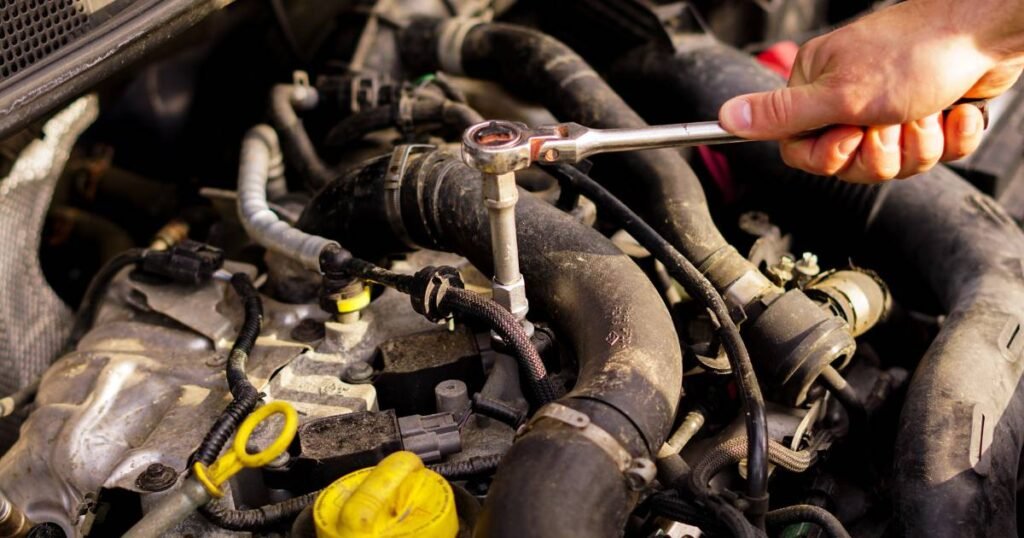Engine oil is like the backstage crew in a play, helping my car’s engine perform smoothly by protecting it from wear. It reduces friction between the moving parts, such as gears, pistons, and valves. These parts work together like a team of dancers, moving in perfect rhythm.
However, if I forget to change the oil, it’s like forgetting lines in a play. This mistake can lead to many problems. Regular oil changes are crucial to keep everything running smoothly. If I neglect this, my car might face serious issues that could have been easily avoided.
Let’s talk about what could go wrong if you don’t care about your car’s engine by regularly changing its oil.
In this article:
Why is Engine oil Important?
Engine oil is like a superhero for your car’s engine. It keeps all the moving parts running smoothly by providing lubrication, which means it helps them move without too much friction. Too much friction can cause the engine to overheat. Engine oil also helps clean the engine by picking up dirt and debris that can get inside.
As time passes, engine oil starts to break down and can’t do its job either. That’s why it’s very important to change the oil regularly. By doing this, you make sure your car’s engine stays healthy and runs well. Here are some key factors that show why motor oil or engine oil is important:
1. Protecting Engine Components
Moving parts within the engine, such as pistons, valves, and crankshafts, experience constant friction during operation.
Engine oil’s lubricating properties create a protective film that minimizes this friction, preventing premature wear and tear of these components.
2. Cooling the engine
While the coolant system plays a major role in engine cooling, engine oil also contributes significantly to this process.
It reaches areas within the engine that coolant cannot, absorbing heat and dissipating it to prevent overheating.
3. Cleaning the Engine’s Interior
Engine oil acts as a cleanser, carrying away small particles and debris accumulating within the engine.
This helps to maintain the smooth operation of moving parts and prevent the buildup of harmful deposits.
What happens if you Don’t change your oil?
1. Voided Vehicle Warranty
One of the most significant risks of skipping oil changes is the potential to void your vehicle’s warranty. Manufacturers often mandate regular oil changes as a condition of warranty coverage. If you fail to adhere to these guidelines, you could be left with costly repair bills without the protection of a warranty.
2. Poor Engine Performance
Oil plays a crucial role in lubricating the moving parts within your engine, ensuring smooth operation and optimal performance. Over time, oil breaks down and becomes contaminated with dirt, debris, and other impurities. This dirty oil can cause increased friction, leading to reduced fuel economy, decreased power, and potential engine damage.
3. Complete Engine Failure
In the most severe cases, neglecting oil changes can result in complete engine failure. When oil becomes excessively dirty or breaks down entirely, it loses its ability to lubricate and protect vital engine components. This can lead to overheating, excessive wear, and engine seizure. A seized engine often requires a costly replacement, which can be a significant financial burden.
4. Clogged Oil Filter
The oil filter plays a vital role in capturing contaminants and preventing them from circulating through the engine. However, oil filters have a limited capacity and can become clogged over time. If the filter is not replaced regularly, it becomes ineffective at filtering out impurities, leading to accelerated engine wear and potential damage.
5. Increased Fuel Consumption
Dirty oil can significantly impact your vehicle’s fuel efficiency. The increased friction caused by contaminated oil forces your engine to work harder, resulting in higher fuel consumption. This means you’ll spend more money at the pump, contributing to increased emissions.
6. Accelerated Engine Wear
The lack of proper lubrication caused by skipping oil changes can accelerate the wear of critical engine components, including pistons, cylinders, bearings, and valves. Over time, this wear can lead to a loss of compression, decreased power, and increased oil consumption.
7. Overheating
Oil also serves as a vital coolant, helping to dissipate heat generated within the engine. When oil becomes dirty or breaks down, it loses its ability to transfer heat effectively. This can cause the engine to overheat, potentially leading to warped components, blown gaskets, and even engine failure.

How Often Should You Get an Oil Change?
Most cars’ recommended oil change interval is every 5,000 to 7,500 miles. However, there are a few factors that can affect how often you need to change your oil, such as:
- The type of oil you use. Synthetic oil lasts longer than conventional oil.
- Your driving habits. If you frequently stop and go or drive in extreme conditions, you may need to change your oil more often.
- The age of your car. Older cars may need more frequent oil changes.
What Happens If You Wait Too Long to Change Your Oil?
If you wait too long to change your oil, it can cause some problems, including:
- Sludge buildup. Dirty oil can turn into sludge, which can clog your engine and lead to serious damage.
- Reduced performance. Old oil can cause your engine to run less efficiently.
- Increased wear and tear. Dirty oil can accelerate wear and tear on your engine’s parts.
- Engine failure. In severe cases, dirty oil can cause your engine to fail.

What are the Benefits of Regular Oil Changes?
Prevent Engine Failure: Fresh oil keeps your engine healthy and reduces the risk of costly breakdowns.
Reduce Engine Wear: Regular oil changes minimize friction and heat, extending engine life.
Increase Resale Value: A well-maintained car with a record of regular oil changes commands a higher resale value.
Improve Overall Maintenance: Oil changes create opportunities for mechanics to spot potential problems early, preventing more expensive repairs down the road.
Help You Stick to a Schedule: Focusing on oil changes can help you stay on track with other essential maintenance tasks.
Stop Catastrophic Failures: Allowing oil to turn to sludge can lead to engine seizure, often requiring a new engine or even totaling the car.
Recommended: What Does A Full-Service Oil Change Consists Of?
What is the Most Popular Auto Center that Does Oil Change?
| Brand | Oil Types | Additional Services | Website |
| Firestone | Conventional, Synthetic, High-Mileage | Tire rotations, brakes, batteries | Website |
| Take 5 Oil Change | Conventional, Synthetic | None | Website |
| Valvoline | Conventional, Synthetic, High-Mileage | Tire rotations, brakes, batteries | Website |
| Walmart | Conventional, Synthetic | Tire rotations, brakes, batteries | Walmart Website |
| Belle Tire | Conventional, Synthetic, High-Mileage | Tire rotations, brakes, batteries | Website |
| Big O Tires | Conventional, Synthetic, High-Mileage | Tire rotations, brakes, batteries | Visit Site here |
| Midas | Conventional, Synthetic, High-Mileage | Tire rotations, brakes, batteries | Midas Site here |
| Pep Boys | Conventional, Synthetic, High-Mileage | Tire rotations, brakes, batteries | Visit Site here |
| Meineke | Conventional, Synthetic, High-Mileage | Tire rotations, brakes, batteries | Visit site here |
Closing Thought
I always make sure to change my car’s oil regularly because it’s very important. Changing the oil helps the engine cool down, removes dirt, and keeps it running smoothly. It’s like giving my car a little break so it can perform at its best.
If I skip oil changes, it can cause serious and expensive problems. That’s why I change my oil every 5,000 to 7,500 miles, depending on how I drive. I also use the right oil and a quality oil filter.
By keeping up with regular oil changes, I help my car’s engine stay healthy. This makes sure my car works well for many years.
You might like reading this: How Much is a Tune-Up At Walmart?
FAQs
How long can I go without changing my Car oil?
I check my owner’s manual to find out when to change my car’s oil. If I use conventional oil, it’s every 5,000 to 7,500 miles, but with synthetic oil, it can last 10,000 to 15,000 miles. The type of oil and my driving habits, like frequent stop-and-go traffic or towing, also affect how quickly the oil wears out.
How long will a car run if you never change the oil?
While it’s technically possible for a car to run for some time without ever changing the oil, it’s not recommended and can lead to serious damage. The more you push it, the worse the damage and the shorter your engine’s lifespan. Eventually, neglecting oil changes will result in engine failure, requiring expensive repairs or even engine replacement.
How bad is it to be overdue for an oil change?
Driving past the recommended oil change date can cause increased friction and wear on engine components due to insufficient lubrication. Over time, this leads to overheating, sludge buildup, and reduced fuel efficiency. Ignoring regular maintenance not only costs more in fuel but also harms the environment with potential oil leaks.
What happens if you wait too long to change oil?
Ignoring oil changes can lead to severe engine damage, such as seized components needing replacement or costly repairs. Neglect can cause reduced car performance and strange knocking sounds, indicating potential problems. Additionally, a poorly lubricated engine increases harmful emissions by burning more oil.
How can I tell if my car needs an oil change?
I check my owner’s manual to know when my car needs an oil change, but I also watch for other signs. If the engine oil is dark and dirty or if my car starts making strange noises, it might be time. Also, if the check engine light turns on, that’s another signal for a possible oil change.
What type of oil should I use in my car?
The type of Motor oil you should use in your car depends on a few factors, such as the make and model of your car and your driving habits. It’s best to consult your owner’s manual or a trusted mechanic to determine the best type of oil for your car.
Can I change my oil?
Yes, you can change your oil. However, it’s important to carefully follow the instructions in your owner’s manual. If you’re uncomfortable changing your oil, you can always take your car to a mechanic.
